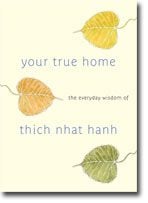 Your True Home: The Everyday Wisdom of Tich Nhat Hanh (Shambhala 2011) arrived in the mail the other day. It’s a lovely book, and I mean the physicality of “book.” It’s a thick 5 by 7 inch volume that you know is packed with wisdom. In fact, it’s a compilation of Thich Nhat Hanh (TNH) writings from across a lifetime of teaching the dharma. The book is configured as a daily reader, with one or two brief paragraphs for each day.
Your True Home: The Everyday Wisdom of Tich Nhat Hanh (Shambhala 2011) arrived in the mail the other day. It’s a lovely book, and I mean the physicality of “book.” It’s a thick 5 by 7 inch volume that you know is packed with wisdom. In fact, it’s a compilation of Thich Nhat Hanh (TNH) writings from across a lifetime of teaching the dharma. The book is configured as a daily reader, with one or two brief paragraphs for each day.
Next to the Dalai Lama, TNH is likely the most well-known Buddhist teacher in the West. His body of work has touched countless readers, seekers, professionals, and veterans.
Today is 15 October corresponding to the day 288 of 2011. Here is the entry 288, entitled “No Inferiority Complex”
Many of us go around all the time feeling that we are as small as a grain of sand. We may feel like our one small human life doesn’t have very much meaning. We struggle to get through life, and at the end of our life we feel that we have accomplished very little.
This is a kind of inferiority complex many poeple suffer from. If we see reality only in terms of the historical dimension, it may seem to us as if there is little one ordinary human being can do. But if we get in touch with the ultimate dimensions of reality, we know that we are just like the Buddha. We share in the Buddha’s nature–we are Buddha nature. When we are able to see beyond the limitations of perceived time and space, byeond our own notions of inferiorty and powerlessness, we find we have great stores of spiritual energy to share with the world.
Without the larger context of the writing, the reader will have to make some inferences. What does he mean by “spiritual energy”? What does he mean by Buddha nature? This passage captures an integral teaching of the Buddha and the Buddhist traditions that followed him. The Buddha was a human being, an ordinary human being at that. While he was a meditation prodigy, he did not see himself as as a god, as if often portrayed in the Asian traditions of Buddhism.
Just like Siddhartha Gautama, we can become awakened. Reading these passages daily may help with that process of awakening. As unique individuals we may be drawn to one teacher over another. Many are drawn to TNH. While I have a reverential respect for him, I have gravitated towards other teachers.
There is a paradox about TNH. One the one hand, he has done more than almost anyone to put Buddhism on the map in the West; on the other hand, he has portrayed Buddhism in a light that might get confused with a New Ageism. You just gush good feelings reading him. You can tell he is an emanation of goodness and one of the great ambassadors for peace in the world.
What gets overlooked is the fierce aspect of the dharma. The dharma is not all about playing nice. It sometimes punches you between the eyes and forces you to look at things and act on things that you have been avoiding. Whatever the “ultimate” is, it contains both dark and light; loud and quiet, sacred and profane.
This book may not be the best for your first introduction to mindfulness or Buddhism. Many of TNH’s other books would serve this purpose well, such as Miracle of Mindfulness and Peace is Every Step. This book is for the initiated who wants to have ready and bite size access to dharma gems to inspire practice, foster mindfulness, and dot your day with a bit of wisdom that may just take you home.

